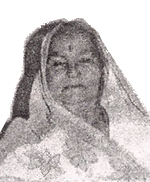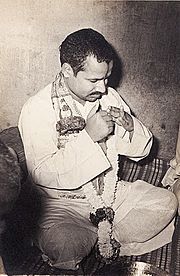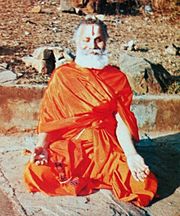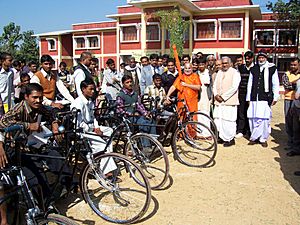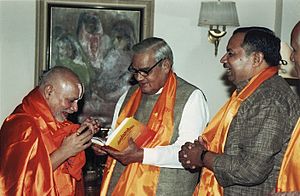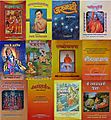Rambhadracharya facts for kids
Quick facts for kids Rambhadracharya |
|
|---|---|
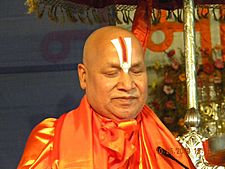
Rambhadracharya in 2009
|
|
| Birth Date | 14 January 1950 Sachipuram earlier known as Shandikhurd, Jaunpur district, Uttar Pradesh, India |
| Birth name | Giridhar Mishra |
| Guru/teacher |
|
| Philosophy | Vishishtadvaita Vedanta |
Jagadguru Ramanandacharya Swami Rambhadracharya (born Giridhar Mishra on January 14, 1950) is an Indian Hindu spiritual leader, teacher, and scholar. He is also a talented poet, author, and musician. He is based in Chitrakoot, India. He is one of the four main leaders, or Jagadgurus, of a Hindu tradition called the Ramanandi sect.
Rambhadracharya is the founder of Tulsi Peeth, a religious and social service center in Chitrakoot. He also started the Jagadguru Rambhadracharya Handicapped University. This special university provides college courses only for students with disabilities.
Amazingly, Rambhadracharya has been blind since he was two months old. He did not go to school until he was 17 and has never used Braille to read or write. He learns by listening and creates his works by speaking them to people who write them down.
He can speak 22 languages and has written over 240 books and 50 research papers. His works include epic poems and detailed explanations of important Hindu texts like the Ramcharitmanas. He is known for his deep knowledge of Sanskrit grammar and Hindu philosophy. He is also a gifted storyteller who shares tales from the Ramayana and other scriptures.
Contents
Early Life and Childhood
Rambhadracharya was born as Giridhar Mishra in a small village in Uttar Pradesh, India. His parents were Rajdev Mishra and Shachidevi Mishra. His great-aunt gave him the name Giridhar, which is another name for the god Krishna.
Losing His Sight
When Giridhar was only two months old, he got an eye infection called trachoma. In his village, there were no modern doctors. A local woman tried to treat him with a traditional paste, but it caused bleeding and he lost his sight completely. His family took him to hospitals in big cities like Lucknow, but his vision could not be saved.
Even though he is blind, Rambhadracharya never used Braille. He learned everything by listening and has an incredible memory.
A Childhood Accident
In 1953, when he was three, Giridhar fell into a dry well while playing. A teenage girl rescued him. His grandfather believed he was saved because he had learned a special verse from the Ramcharitmanas, a holy book. The verse says that those who sing about the god Rama will be protected. From that day on, Giridhar made it a habit to recite the verse before eating or drinking.
First Poem
Giridhar's grandfather taught him stories from Hindu epics like the Ramayana and Mahabharata. At just three years old, he composed his first poem. The poem was about Krishna's mother, Yashoda, arguing with a milkmaid who had bothered her son.
Mastering Holy Books
At age five, Giridhar memorized the entire Bhagavad Gita, a sacred Hindu text with 700 verses, in only 15 days. Two years later, at age seven, he memorized the entire Ramcharitmanas, which has nearly 11,000 verses, in 60 days. He went on to memorize many other important works in Sanskrit and Indian literature.
Formal Education
Giridhar did not attend school until he was 17. His family wanted him to be a storyteller, but he wanted to study. In 1967, he finally enrolled in a Sanskrit college to study grammar, Hindi, English, and other subjects.
Because he could memorize things after hearing them just once, he quickly became the top student in his class.
Higher Education
In 1971, Giridhar went to Sampurnanand Sanskrit University in Varanasi. He earned his Bachelor of Arts degree in 1974. While studying for his Master of Arts degree, he won five gold medals in a national Sanskrit competition. The Prime Minister of India at the time, Indira Gandhi, was so impressed that she offered to send him to the United States for eye treatment. Giridhar politely declined the offer.
He earned his master's degree in 1976 with seven gold medals. He later earned a PhD in 1981 and a post-doctorate degree (DLitt) in 1997 for his deep study of Sanskrit grammar.
Later Life and Important Work
In 1983, Giridhar decided to dedicate his life to religion and became a vairagi (a person who renounces worldly life). He was given the new name Rambhadradas.
Tulsi Peeth
In 1987, Rambhadradas founded Tulsi Peeth in Chitrakoot. This is a place where the god Rama is said to have lived during his exile. The center includes a beautiful temple made of glass, called Kanch Mandir.
Becoming a Jagadguru
In 1988, Rambhadradas was chosen to be a Jagadguru Ramanandacharya, one of the highest spiritual leaders in his tradition. After this, he became known as Jagadguru Ramanandacharya Swami Rambhadracharya.
Expert Witness in Ayodhya Case
In 2003, Rambhadracharya was asked to be an expert witness in a major court case about a disputed holy site in Ayodhya. He used his deep knowledge of ancient Hindu texts, like the Ramayana and others, to provide information about the history of the site. He explained that these texts describe Ayodhya as the birthplace of Rama.
Helping People with Disabilities
One of Rambhadracharya's greatest achievements is his work for people with disabilities.
- In 1996, he started the Tulsi School for the Blind in Chitrakoot.
- In 2001, he founded the Jagadguru Rambhadracharya Handicapped University. This was the first university in the world created exclusively for disabled students. The university offers degrees in many subjects, including arts, music, computer science, and education. It helps students who are visually impaired, hearing impaired, or have mobility or mental challenges.
He also runs an organization that helps disabled children in rural India get a good education and operates a hospital in Gujarat.
Major Works
Rambhadracharya has written more than 250 books and 50 papers. He writes in many languages, including Sanskrit, Hindi, and Awadhi.
Epic Poems
He has written four epic poems. Two of them are in Sanskrit and two are in Hindi.
- Śrībhārgavarāghavīyam (2002): A Sanskrit epic for which he won the prestigious Sahitya Akademi Award for Sanskrit.
- Aṣṭāvakra (2010): A Hindi epic.
- Arundhatī (1994): A Hindi epic.
- Gītarāmāyaṇam (2011): A Sanskrit epic poem set to music.
Commentaries
A commentary is a book that explains another book. Rambhadracharya has written important commentaries on major Hindu scriptures.
- Śrīrāghavakṛpābhāṣyam: This is a set of Sanskrit commentaries on the Prasthanatrayi (the Brahma Sutra, the Bhagavad Gita, and the main Upanishads). He was the first person in nearly 500 years to write commentaries on all these texts.
- Bhāvārthabodhinī: A Hindi commentary on the Ramcharitmanas.
- Mahavīrī: A Hindi commentary on the Hanuman Chalisa.
Awards and Recognition
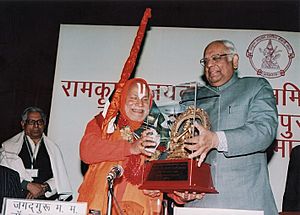
Rambhadracharya is highly respected in India and around the world. Many leaders have praised his knowledge and work.
- In 2015, he received the Padma Vibhushan, India's second-highest civilian award.
- In 2024, he received the Jnanpith Award, India's highest literary award.
- He has also received the Sahitya Akademi Award and the Sahitya Akademi Fellowship for his contributions to literature.
In 2000, he was invited to speak at the Millennium World Peace Summit at the United Nations in New York. In 2014, Indian Prime Minister Narendra Modi nominated him to help with the Clean India Campaign, a national effort to improve sanitation.
Images for kids
See also
 In Spanish: Jagadguru Rambhadracharya para niños
In Spanish: Jagadguru Rambhadracharya para niños
- Timeline of Rambhadracharya
- List of Hindu gurus and saints
- List of Sahitya Akademi Award winners for Sanskrit


